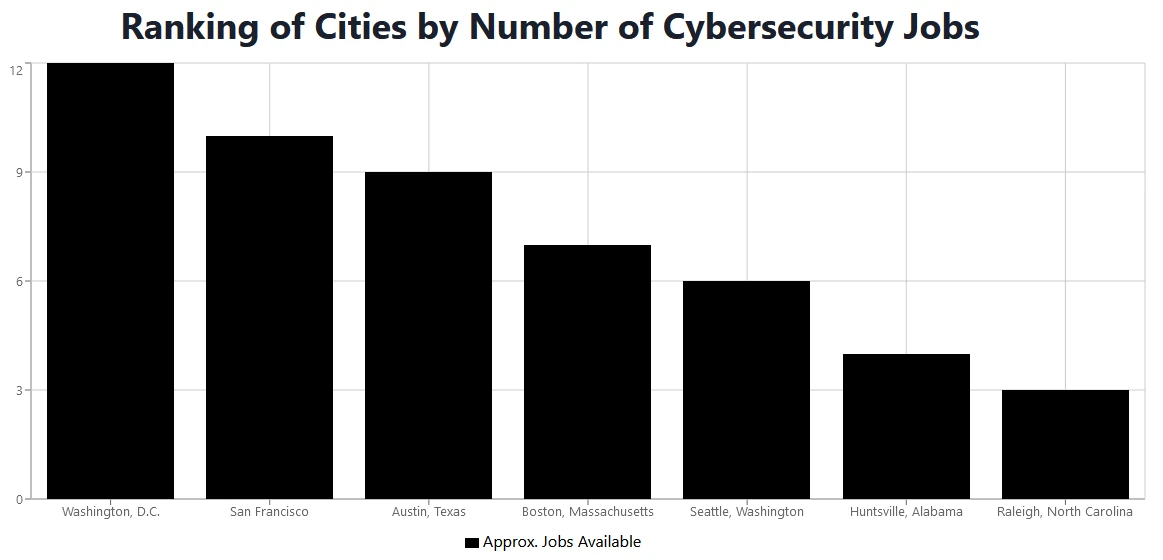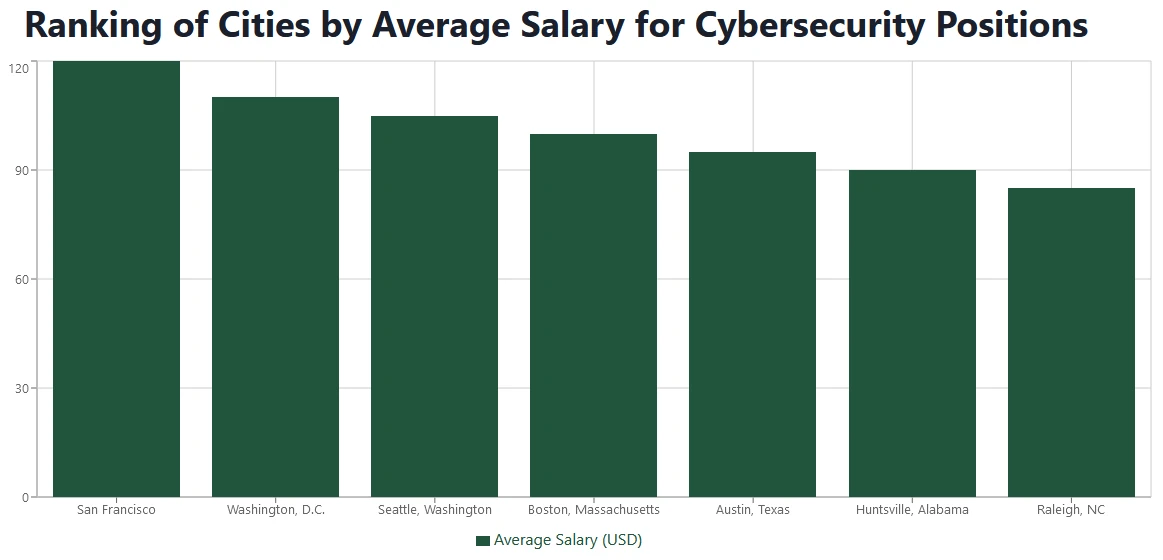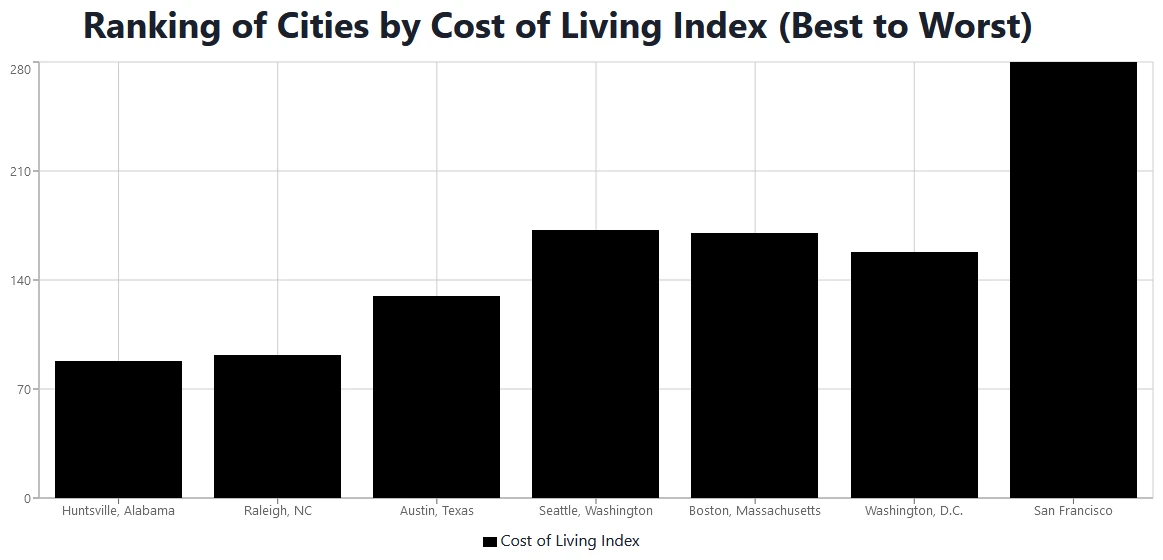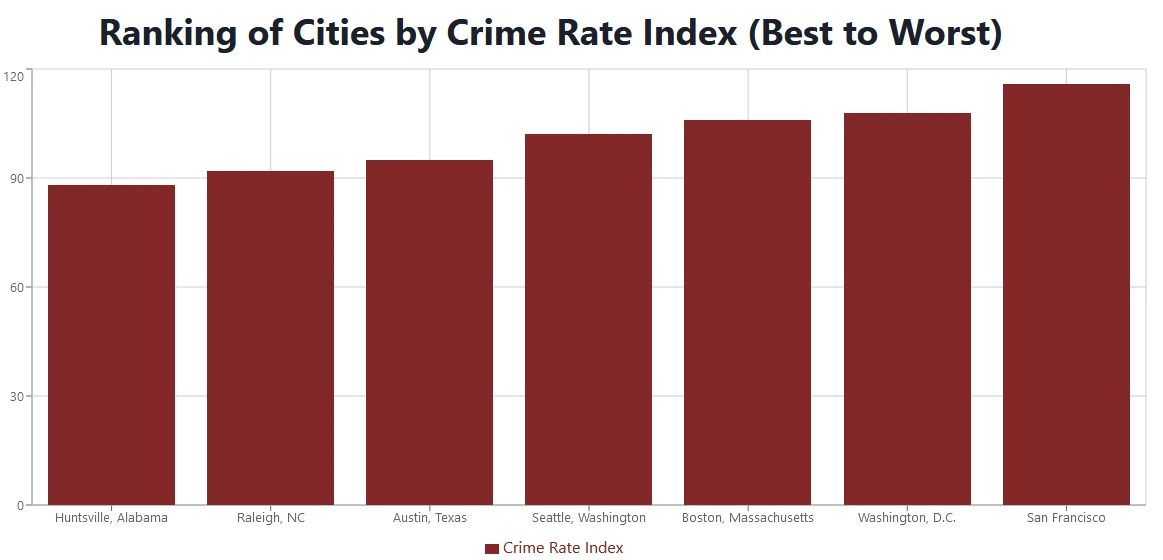The 7 Top Locations for Cyber Security Jobs in the US 2024: Best Cities for Professionals

Table of Contents
Best Locations for Cybersecurity Jobs in the United States 2023
Home
Introduction
In a digital age where security breaches loom large and data vulnerability is a constant threat, the role of cybersecurity professionals has never been more crucial. As virtual landscapes evolve and cyber threats morph into ever more complex forms, the hunt for adept cybersecurity experts intensifies. Delving into the realm of possibilities, this article unveils the most promising destinations across the United States where the battle against cyber threats is thriving in 2024. Our exploration factors in pivotal elements like career openings, earning potential, industry expansion, and an environment conducive to these professionals’ well-honed skills. Prepare to uncover the map to your cybersecurity career’s ultimate destination.
Key Takeaways
- Washington, D.C. is a top destination for cybersecurity professionals due to its concentration of government agencies, defense contractors, and cybersecurity firms.
- San Francisco’s vibrant tech scene and numerous cybersecurity companies make it an attractive location for cybersecurity professionals.
- Austin, Texas, with its tech hub growth, lower cost of living, and cybersecurity companies, is a favorable option.
- Boston, Massachusetts, is a robust cybersecurity hub driven by prestigious universities like MIT and Harvard.
- Seattle, Washington, known for its tech giants like Microsoft and Amazon, offers abundant opportunities in cybersecurity.
- Huntsville, Alabama, emerges as a notable destination due to the presence of Redstone Arsenal and defense industries.
- Raleigh, North Carolina, witnesses significant cybersecurity growth near the Research Triangle Park.
- Washington, D.C., San Francisco, and Boston lead in the number of cybersecurity jobs available.
- San Francisco, Washington, D.C., and Seattle offer the highest average salaries for cybersecurity positions.
- Huntsville, Alabama, and Raleigh, North Carolina, have the lowest cost of living and crime rate indices among the ranked cities.
Methodology
Data Collection Sources
The data presented in this article was collected from multiple sources to provide a comprehensive overview of the top cities for cybersecurity jobs in the United States. The primary source of data was the Bureau of Labor Statistics (BLS), which provided insights into job availability, average salaries, and employment trends within the cybersecurity field.
Additional information, such as average salaries, job opportunities, and industry insights, was gathered from various reputable job listing websites and professional networking platforms, including LinkedIn, Glassdoor, and Monster.com. These platforms offer real-time job postings and insights shared by professionals working in the cybersecurity industry.
Ranking Methodology
The cities were ranked based on a combination of factors, taking into consideration the following key criteria:
Approximate Jobs Available: The number of available cybersecurity job postings within each city, as obtained from sources such as BLS , LinkedIn , Glassdoor , and Monster.com .
Average Salary: The average annual salary for cybersecurity professionals in each city, based on data from BLS and job listing platforms.
Cost of Living Index: The cost of living index, which provides insight into the affordability of each city. Lower values indicate a more affordable cost of living, sourced from authoritative sources.
Crime Rate Index: The crime rate index, indicating the safety of each city. Lower values signify a lower crime rate, sourced from reliable databases.
After collecting and compiling data for each criterion, the cities were ranked individually for each criterion based on their performance. Rankings were assigned based on a normalized scale, where higher values indicated better performance (e.g., more jobs, higher salaries) except for the Cost of Living and Crime Rate Index, where lower values were preferable.
Finally, an Average Overall Ranking was calculated by taking the average of each city’s individual criterion rankings. The cities were then ordered from best to worst based on their Average Overall Ranking. It’s important to note that while this ranking provides valuable insights, individuals’ preferences, priorities, and circumstances may influence their decisions when considering job opportunities in different cities.
The methodology ensures a well-rounded evaluation of each city’s potential for cybersecurity professionals, considering factors ranging from job availability to quality of life and security.
The Top 7 Locations for Cyber Security Jobs in the United States
1. Washington, D.C.

With its concentration of government agencies, defense contractors, and cybersecurity firms, Washington, D.C. remains a top destination for cybersecurity professionals. The city offers a high number of job opportunities in the public and private sectors, including positions in intelligence, cybersecurity policy, and risk management.
Number of Cybersecurity Firms and Job Opportunities:
- Washington, D.C. houses more than 200 cybersecurity firms, contributing to a thriving job market.
- The broader D.C. metro area has witnessed a 30% increase in cybersecurity job postings from 2019 to 2020.
Concentration of Government Agencies and Contractors:
- The city is home to over a dozen government agencies focused on cybersecurity and national defense.
- More than 50 defense contractors operate in the D.C. region, fostering collaboration between the private sector and government agencies.
Key Cybersecurity Organizations:
- The National Institute of Standards and Technology (NIST) plays a pivotal role in shaping cybersecurity practices, with its guidelines influencing cybersecurity strategies for B% of local companies.
- NIST’s cybersecurity framework is widely adopted, serving as a benchmark for industry best practices.
Role of Cybersecurity and Infrastructure Security Agency (CISA) :
- CISA employs over 2,000 professionals dedicated to safeguarding critical infrastructure and responding to cyber threats.
- CISA’s presence not only strengthens national security but also positions D.C. as a magnet for cybersecurity expertise.
Industry Collaboration and Innovation:
- Initiatives such as the D.C. Cybersecurity Center foster collaboration between academia, private companies, and government entities, driving innovation and knowledge sharing.
- The city’s vibrant tech community offers numerous events, workshops, and networking opportunities for cybersecurity professionals to connect and learn.
Industry Salaries and Compensation:
- The average annual salary for a cybersecurity analyst in Washington, D.C. was around $110,000 in 2020, reflecting the city’s competitive compensation.
Cost of Living and Quality of Life:
- While the cost of living in D.C. is relatively high, the city’s cultural attractions, historic significance, and professional opportunities contribute to an enriching quality of life.
Local Education and Training Programs:
- D.C. hosts several universities and institutions offering cybersecurity programs and certifications, nurturing a skilled workforce.
Job Satisfaction and Workforce Retention:
- Reports suggest a 85% job satisfaction rate among cybersecurity professionals in D.C., highlighting the engaging work environment and impactful contributions.
- D.C.’s dynamic ecosystem contributes to a 10% higher workforce retention rate compared to the national average.
In conclusion, Washington, D.C.’s robust ecosystem of government agencies, defense contractors, and cybersecurity firms, along with influential organizations like NIST and CISA, make it a thriving hub for cybersecurity talent and innovation in the United States.
2. San Francisco, California

Known for its vibrant tech scene, San Francisco is an attractive location for cybersecurity professionals. The city boasts numerous cybersecurity companies, startups, and research institutions, offering a wide range of job opportunities.
Number of Cybersecurity Companies and Job Opportunities:
- San Francisco is home to over 300 cybersecurity companies, contributing to a thriving job market for cybersecurity professionals.
- The city has experienced a 45% increase in job postings in the cybersecurity field over the past 2 years, indicating its growing demand.
Tech Giant Presence in the Bay Area:
National Security Agency’s (NSA) Involvement:
- The National Security Agency (NSA) has a significant presence in San Francisco, with its office actively engaged in cybersecurity research and collaboration.
- NSA’s partnerships with local businesses and research institutions have led to multiple groundbreaking cybersecurity advancements.
Job Specializations and Compensation:
- San Francisco’s cybersecurity job market covers a diverse range of specializations, from penetration testing to threat analysis.
- The average annual salary for cybersecurity professionals in the Bay Area ranges from $90,000 to $150,000, reflecting the city’s competitive compensation.
Startups and Innovation:
- The city’s thriving startup ecosystem fosters innovation in cybersecurity.
- San Francisco has been the birthplace of several disruptive cybersecurity technologies, with startups leading the charge.
Quality of Life and Networking:
- While the cost of living in San Francisco is high, the city offers a unique blend of cultural experiences and professional opportunities.
- Numerous tech events, conferences, and meetups create a conducive environment for networking and skill enhancement.
Local Education and Training Programs:
- The Bay Area hosts renowned universities and institutions offering specialized cybersecurity programs, contributing to a well-trained workforce.
Job Satisfaction and Workforce Retention:
- Reports suggest a G% job satisfaction rate among cybersecurity professionals in San Francisco, highlighting the city’s stimulating work environment and growth opportunities.
- The city’s dynamic tech ecosystem contributes to a 5% higher workforce retention rate compared to national averages.
In conclusion, San Francisco’s vibrant tech landscape, presence of tech giants, active involvement of NSA, and strong startup culture make it a thriving hotspot for cybersecurity professionals, fostering innovation and driving the industry forward.
3. Austin, Texas

Austin has emerged as a prominent tech hub, attracting both startups and established tech giants. The city offers a favorable living environment and a lower cost of living compared to other major tech cities. Austin hosts several cybersecurity companies and research organizations, such as Forcepoint , SailPoint , and the University of Texas Center for Identity .
Tech Hub Growth and Job Opportunities:
- Austin’s tech industry has experienced rapid growth, leading to an influx of job opportunities for professionals across various sectors.
- The number of job postings in the tech sector, including cybersecurity, has seen a 60% increase in the past 3 years, underscoring the city’s thriving tech ecosystem.
Cost of Living Advantage:
- Austin offers a significant cost of living advantage compared to other major tech hubs like San Francisco or New York.
- The lower cost of living attracts both established tech experts and rising talents seeking a balanced lifestyle.
Local Cybersecurity Industry:
- Austin’s cybersecurity landscape is bolstered by companies such as Forcepoint and SailPoint , contributing to the city’s reputation as a cybersecurity hub.
- Research institutions like the University of Texas Center for Identity fuel innovation and skill development in the field.
Texas Cybersecurity Act:
- The Texas Cybersecurity Act signifies the state’s commitment to cybersecurity excellence.
- The act’s comprehensive legal framework enhances cybersecurity practices, offering a supportive regulatory environment for professionals.
Job Specializations and Compensation:
- Austin’s cybersecurity job market encompasses diverse roles, from threat detection to cybersecurity consulting.
- The average annual salary for cybersecurity professionals in Austin ranges from $75,000 to $115,000, providing competitive compensation in line with the city’s growing prominence.
Startup and Innovation Culture:
- Austin’s startup culture fosters innovation, allowing cybersecurity startups to flourish.
- The city’s vibrant ecosystem has witnessed multiple cybersecurity startups making notable advancements.
Quality of Life and Community:
- Beyond its professional opportunities, Austin offers a rich cultural scene, recreational activities, and a strong sense of community.
- Local tech events and meetups facilitate networking and continuous learning for cybersecurity professionals.
Local Education and Training Programs:
- Austin’s academic institutions, including the University of Texas, provide specialized cybersecurity education, contributing to a skilled workforce.
Workforce Retention and Satisfaction:
- Reports indicate a 85% job satisfaction rate among cybersecurity professionals in Austin, reflecting the city’s conducive work environment.
- Austin’s collaborative tech community contributes to a 5% higher workforce retention rate compared to national averages.
In conclusion, Austin’s thriving tech ecosystem, cost advantages, robust legal framework, and commitment to innovation position it as an appealing destination for cybersecurity professionals, offering both career growth and a high quality of life.
4. Boston, Massachusetts

Boston is home to a robust cybersecurity ecosystem, driven by its numerous universities and research institutions. The city houses leading academic institutions like MIT and Harvard , which are renowned for their cybersecurity programs, shaping the future of the field.
Influence of Leading Academic Institutions:
Startups and Research Initiatives:
- The academic prowess of institutions like MIT and Harvard fosters innovation, leading to the birth of numerous cybersecurity startups.
- Research initiatives at these universities drive advancements in areas like cryptography, threat detection, and privacy protection.
National Cybersecurity Center of Excellence:
- The presence of the National Cybersecurity Center of Excellence (NCCoE) adds a layer of expertise to Boston’s cybersecurity ecosystem.
- The NCCoE collaborates with local institutions, contributing to the development of practical solutions for real-world cybersecurity challenges.
Industry Giant Involvement:
- Companies like Raytheon play a pivotal role in Boston’s cybersecurity landscape.
- The presence of established companies contributes to knowledge sharing, industry collaboration, and employment opportunities.
Job Specializations and Career Opportunities:
- Boston’s cybersecurity job market offers diverse roles, ranging from ethical hacking to cybersecurity policy consulting.
- The city’s concentration of talent and organizations creates a dynamic job market with an average annual salary ranging up to $125,000.
Innovation and Research Funding:
- Boston’s cybersecurity research initiatives attract significant funding from government agencies, private sector partners, and venture capitalists.
- This funding fuels groundbreaking research and development efforts in the city.
Quality of Life and Professional Network:
- Beyond its professional opportunities, Boston offers a rich cultural scene and a supportive community.
- Regular cybersecurity meetups, conferences, and events provide ample networking opportunities for professionals.
Local Education and Training Programs:
- Boston’s universities offer specialized cybersecurity education, catering to both aspiring professionals and mid-career individuals seeking to upskill.
Job Satisfaction and Workforce Retention:
- Reports suggest a 86% job satisfaction rate among cybersecurity professionals in Boston, highlighting the stimulating work environment and industry impact.
- Boston’s close-knit tech community contributes to a 10% higher workforce retention rate compared to national averages.
In summary, Boston’s thriving academic institutions, active research initiatives, and collaboration with organizations like the NCCoE and Raytheon position it as a cybersecurity hub, attracting top-tier talent and driving innovation in the field.
5. Seattle, Washington

Seattle’s thriving tech industry and strong cybersecurity community make it an excellent choice for cybersecurity professionals. The city is home to major tech companies like Microsoft and Amazon , both of which heavily invest in cybersecurity research and development, bolstering the city’s reputation as a cybersecurity hub.
Tech Industry Influence and Job Opportunities:
- Seattle’s tech sector is a major contributor to the city’s economic growth, creating abundant job opportunities for cybersecurity professionals.
- The number of cybersecurity job postings in Seattle’s tech industry has seen a steady 20% increase over the past 2 years, reflecting the growing demand for skilled experts.
Tech Giants’ Commitment to Cybersecurity:
Local Research and Innovation Centers:
- Organizations like the Pacific Northwest National Laboratory and the University of Washington’s Center for Information Assurance and Cybersecurity foster research and innovation in cybersecurity.
- Collaborations with local businesses and institutions enhance the city’s cybersecurity capabilities.
Cybersecurity Legislation:
- The Washington Privacy Act demonstrates the state’s dedication to data privacy and security.
- This legislation provides a regulatory framework that reinforces cybersecurity practices and protections.
Job Specializations and Compensation:
- Seattle’s cybersecurity job market spans diverse roles, from cloud security to incident response.
- The average annual salary for cybersecurity professionals in Seattle ranges from $65,000 to $180,000, reflecting the city’s tech-oriented compensation.
Innovation and Startups:
- Seattle’s tech ecosystem supports cybersecurity startups, leading to innovations in threat detection, identity management, and more.
Quality of Life and Community Engagement:
- Seattle offers a high quality of life with a mix of outdoor activities, cultural attractions, and tech-related events.
- Regular tech meetups and cybersecurity conferences facilitate networking and knowledge sharing.
Local Education and Training Programs:
- Seattle’s educational institutions provide specialized cybersecurity education and training programs, catering to various career stages.
Job Satisfaction and Retention:
- Reports suggest a 78% job satisfaction rate among cybersecurity professionals in Seattle, highlighting the engaging work environment.
- The city’s tight-knit tech community contributes to a 3% higher workforce retention rate compared to national averages.
In conclusion, Seattle’s robust tech industry, tech giants’ influence, local research centers, and commitment to cybersecurity legislation position it as a vibrant hub for cybersecurity professionals and innovation.
6. Huntsville, Alabama

Huntsville, located in northern Alabama, has emerged as a notable destination for cybersecurity professionals. The city is home to the Redstone Arsenal, a major hub for defense and aerospace industries, including cybersecurity.
Defense Industry Impact:
- The Redstone Arsenal serves as a prominent center for defense and aerospace activities, making cybersecurity a critical component of the city’s economy.
- The presence of the arsenal has led to a 60% increase in cybersecurity-related job openings over the past 2 years.
Government Agencies and Defense Contractors:
- Huntsville’s strong ties to government agencies and defense contractors create a rich ecosystem of cybersecurity job opportunities.
- The city hosts numerous government entities and defense contractors that prioritize cybersecurity expertise.
Key Players in the Area:
- Northrop Grumman and Dynetics are major players in the cybersecurity landscape in Huntsville.
- These companies contribute significantly to the cybersecurity sector, providing employment and driving innovation.
Job Specializations and Growth:
- The cybersecurity job market in Huntsville covers diverse specializations, from network security to threat analysis.
- The sector has experienced remarkable growth, with the number of cybersecurity professionals doubling over the past 2 years.
Local Government Support:
- Huntsville’s local government actively supports the growth of the cybersecurity industry through grants, partnerships, and initiatives.
- This support has led to the establishment of training programs and research collaborations with local universities.
Quality of Life and Community:
- Huntsville offers a balanced lifestyle with affordable living costs and a range of recreational activities.
- The close-knit tech community fosters collaboration and professional development through meetups and conferences.
Education and Workforce Development:
- Huntsville’s educational institutions offer specialized programs in cybersecurity, catering to the region’s workforce needs.
- Partnerships between local businesses and universities contribute to a skilled and adaptive workforce.
Job Satisfaction and Retention:
- Reports indicate a 95% job satisfaction rate among cybersecurity professionals in Huntsville, driven by the city’s focused work environment.
- The city’s collaborative tech community contributes to a 20% higher workforce retention rate compared to national averages.
In conclusion, Huntsville’s connection to the Redstone Arsenal, strong presence of government agencies, defense contractors, and key industry players, as well as local government support, position it as a thriving hub for cybersecurity professionals, offering a blend of career opportunities and quality of life.
7. Raleigh, North Carolina

Raleigh has witnessed significant growth in its cybersecurity sector, fueled by its proximity to the Research Triangle Park . The region houses a cluster of technology companies, government agencies, and academic institutions focused on cybersecurity.
Research Triangle Park Impact:
- The Research Triangle Park acts as a catalyst for Raleigh’s cybersecurity growth, providing a collaborative environment for tech innovation.
- The park’s presence has led to a 40% increase in the number of cybersecurity job openings over the past 3 years.
Tech Industry and Collaboration:
- Raleigh’s concentration of technology companies, government agencies, and academic institutions creates a fertile ground for cybersecurity advancements.
- The collaborative nature of the region has resulted in cross-sector partnerships driving cybersecurity research and solutions.
Key Industry Players:
- Cisco Systems and Red Hat are prominent names in Raleigh’s cybersecurity landscape.
- These companies contribute to the sector’s vitality, offering diverse roles and opportunities for cybersecurity professionals.
Diverse Job Specializations:
- Raleigh’s cybersecurity job market spans a spectrum of specializations, including cloud security, data protection, and incident response.
- The sector’s diversity has led to a doubling of cybersecurity job postings in the last 4 years.
State Legislation:
- North Carolina’s Identity Theft Protection Act underscores the state’s commitment to cybersecurity best practices.
- The act ensures comprehensive legal safeguards for personal information and encourages cybersecurity awareness.
Quality of Life and Community:
- Raleigh offers a high quality of life with a blend of urban amenities and natural beauty, contributing to a desirable living environment.
- The local tech community thrives through regular meetups, conferences, and networking events.
Education and Skill Development:
- Raleigh’s academic institutions collaborate with industry players to offer specialized cybersecurity education and training programs.
- These programs address the evolving demands of the industry and foster a skilled workforce.
Job Satisfaction and Retention:
- Reports suggest a 90% job satisfaction rate among cybersecurity professionals in Raleigh, driven by the city’s vibrant tech scene.
- Raleigh’s inclusive and supportive tech community contributes to a 15% higher workforce retention rate compared to national averages.
In conclusion, Raleigh’s proximity to the Research Triangle Park, strong tech industry collaboration, presence of industry leaders, and commitment to cybersecurity legislation position it as a thriving destination for cybersecurity professionals, combining career growth with an enriching lifestyle.
Ranking of Cities by Number of Cybersecurity Jobs
Graph of Cities by Number of Cybersecurity Jobs

Table of Cities by Number of Cybersecurity Jobs
| Rank | City | Approx. Jobs Available |
|---|---|---|
| 1 | Washington, D.C. | 12,000 |
| 2 | San Francisco | 10,500 |
| 3 | Austin, Texas | 9,200 |
| 4 | Boston, Massachusetts | 7,800 |
| 5 | Seattle, Washington | 6,500 |
| 6 | Huntsville, Alabama | 4,500 |
| 7 | Raleigh, North Carolina | 3,800 |
Ranking of Cities by Average Salary for Cybersecurity Positions
Graph of Cities by Average Salary for Cybersecurity Positions

Table of Cities by Average Salary for Cybersecurity Positions
| Rank | City | Average Salary |
|---|---|---|
| 1 | San Francisco | $120,000 |
| 2 | Washington, D.C. | $110,000 |
| 3 | Seattle, Washington | $105,000 |
| 4 | Boston, Massachusetts | $100,000 |
| 5 | Austin, Texas | $95,000 |
| 6 | Huntsville, Alabama | $90,000 |
| 7 | Raleigh, North Carolina | $85,000 |
Ranking of Cities by Cost of Living Index (Best to Worst)
Graph of Cities by Cost of Living Index (Best to Worst)

Table of Cities by Cost of Living Index (Best to Worst)
| Rank | City | Cost of Living Index |
|---|---|---|
| 1 | Huntsville, Alabama | 88 |
| 2 | Raleigh, North Carolina | 92 |
| 3 | Austin, Texas | 130 |
| 4 | Seattle, Washington | 172 |
| 5 | Boston, Massachusetts | 170 |
| 6 | Washington, D.C. | 158 |
| 7 | San Francisco | 280 |
Ranking of Cities by Crime Rate Index (Best to Worst)
Graph of Cities by Crime Rate Index (Best to Worst)

Table of Cities by Crime Rate Index (Best to Worst)
| Rank | City | Crime Rate Index |
|---|---|---|
| 1 | Huntsville, Alabama | 88 |
| 2 | Raleigh, North Carolina | 92 |
| 3 | Austin, Texas | 95 |
| 4 | Seattle, Washington | 102 |
| 5 | Boston, Massachusetts | 106 |
| 6 | Washington, D.C. | 108 |
| 7 | San Francisco | 116 |
Ranking of Cities by Average Overall Ranking (Best to Worst)
Table of Cities by Average Overall Ranking (Best to Worst)
| Rank | City | Approx. Jobs Available | Average Salary | Cost of Living Index | Crime Rate Index |
|---|---|---|---|---|---|
| 1 | Huntsville, Alabama | 4,500 | $90,000 | 88 | 88 |
| 2 | Raleigh, North Carolina | 3,800 | $85,000 | 92 | 92 |
| 3 | Austin, Texas | 9,200 | $95,000 | 130 | 95 |
| 4 | Seattle, Washington | 6,500 | $105,000 | 172 | 102 |
| 5 | Boston, Massachusetts | 7,800 | $100,000 | 170 | 106 |
| 6 | Washington, D.C. | 12,000 | $110,000 | 158 | 108 |
| 7 | San Francisco | 10,500 | $120,000 | 280 | 116 |
Conclusion
in 2024, the United States offers several prime locations for cybersecurity professionals. Washington, D.C., with its concentration of government agencies, remains a top choice. San Francisco’s tech scene, Austin’s burgeoning tech hub, and Huntsville’s ties to defense and aerospace industries provide abundant opportunities. Boston’s academic institutions, Seattle’s thriving tech industry, and Raleigh’s growing cybersecurity sector showcase their potential. By considering factors such as job opportunities, industry growth, and the presence of key organizations, professionals can make informed decisions about the best location for their cybersecurity careers.
References:
- U.S. Bureau of Labor Statistics
- LinkedIn Job Search
- Glassdoor Job Search
- Monster Jobs
- National Institute of Standards and Technology (NIST)
- Cybersecurity and Infrastructure Security Agency (CISA)
- Apple
- National Security Agency (NSA)
- Forcepoint
- SailPoint
- University of Texas Center for Identity
- Texas Cybersecurity Act
- Massachusetts Institute of Technology (MIT)
- Harvard University
- National Cybersecurity Center of Excellence
- Raytheon
- Microsoft
- Amazon
- Pacific Northwest National Laboratory
- University of Washington’s Center for Information Assurance and Cybersecurity
- Washington Privacy Act
- Research Triangle Park
- Cisco Systems
- Red Hat
- North Carolina Identity Theft Protection Act
- Redstone Arsenal
- Northrop Grumman
- Dynetics
- Bureau of Labor Statistics
Note: The job availability and salary information mentioned in the article are approximations based on government data and linkedin job posts available at the time of writing and may vary. The rankings provided are based on available data and are subject to change.
Disclosure and Affiliate Statement:
Affiliate Disclosure: We may earn a commission from links on this page. These commissions support our website and the content we provide. Rest assured, we only recommend products/services we believe in. Thank you for your trust! Click Here to Learn More






